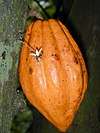Broma process
.jpg)
In chocolate making, the Broma process (not to be confused with the Dutch Process), is a method of extracting cocoa butter from roasted cocoa beans.[1] The Broma process consists of hanging bags of roasted cocoa beans in a very warm room, above the melting point of cocoa butter (slightly above room temperature), and allowing the cocoa butter to drip off the beans, where it is collected.[2] The Dutch Process differs from the Broma process in that, after the cocoa butter has been drained off the beans as described above, the beans are then soaked in an alkaline solution to make them chemically neutral.
After removal, the cocoa butter can either be used to produce richer bars of chocolate, or, when combined with milk and sugar, to create white chocolate. After the Broma process is completed, the remaining dry cocoa beans are usually ground into cocoa powder, which is sold to consumers.[2]
See also
References
- ↑ "Ask The Editors: Unsweetened Vs. Dutch Cocoa Powder". Huffington Post. Retrieved 6 July 2015.
- 1 2 "Ask the Alchemist #2: When do I press the cocoa butter out?". Chocolate alchemy. Retrieved 6 July 2015.
